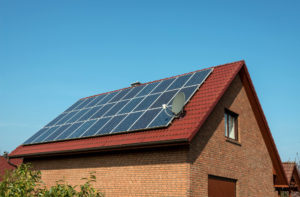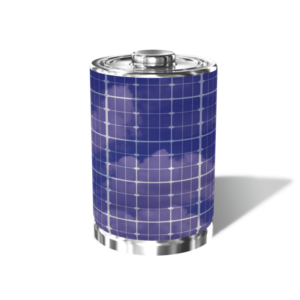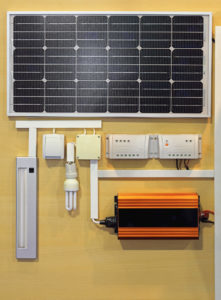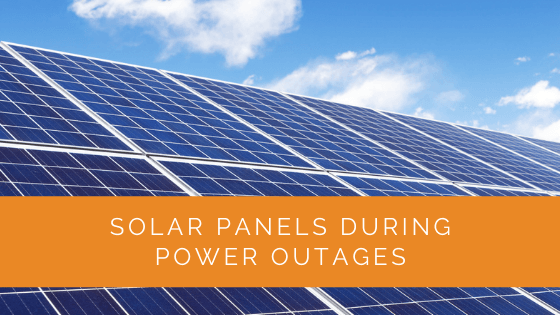As we make advancements in technology and electricity, there is also a growing amount of power outages in the United States. A power outage usually comes in the way of your smoothly functioning life.
These power outages occur when electrical supply is unavailable through the electric grid leading to loss of electrical power grid. In such times, having a backup power source is very useful.
With solar energy storage and solar panels being widely used, the USA is taking a step forward in making the environment more sustainable and eco-friendly.
Installation of solar panels allows you to generate your electricity, which is accessible and sustainable.
Majority of the solar panel systems installed in the U.S. function through a grid-tied solar system. Through this grid-tied system, you can generate free and clean energy with the help of net metering.
This gives you access to electricity anytime, along with free electricity storage.
The solar panel system by itself doesn’t generate electricity during a power outage. During such times, you can either choose to update your system with energy storage or let go of the grid-tied system and instead go for an off-grid solar system.
Contents
- 1 Key Takeaways
- 2 What is the Difference Between a Grid-Tied System and an Off-Grid System?
- 3 How Can Solar Panels Be Used During Power Outages?
- 4 How Do Solar Batteries Work?
- 5 Pros and Cons of Using a Solar Battery Storage
- 6 What Is a Solar Generator?
- 7 What is a Solar Inverter?
- 8 Experience Solar Excellence with Us!
- 9 Bottom Line
Key Takeaways
- Solar panels and solar energy storage offer a valuable backup power source during power outages in the USA, making the environment more sustainable.
- Solar systems can function in two ways during outages: with an off-grid system for complete energy independence or a battery-backed system for a more cost-efficient option.
- Pros of using solar battery storage include eco-friendliness and portability, while cons include limited power generation, high cost, and maintenance requirements. Solar generators and inverters are alternative options for backup power.
What is the Difference Between a Grid-Tied System and an Off-Grid System?
When it comes to electricity distribution, your utility helps in generating electricity through the electric grid. A grid-tied system ensures that you will be connected to the grid throughout.
 Even when your system is not generating energy, the grid-tied solar systems help you draw power from your utility grid. Through metering, your utility sends excess electricity to the grid for credit.
Even when your system is not generating energy, the grid-tied solar systems help you draw power from your utility grid. Through metering, your utility sends excess electricity to the grid for credit.
Now coming to an off-grid system – this power system, as the name suggests, is not connected to the grid. This gives you complete energy independence. What happens in this system is that you will only have access to the electricity generated by your system and stored in the solar batteries.
What’s better in this system is that you’ll still have access to power even if the grid goes down.
With a grid-tied solar power system, you won’t get electricity in case of a power outage since excess energy is stored in the grid. If you choose to go for an off-grid solar power system, you can access electricity stored in the solar battery.
Knowing the grid power system is essential in understanding how solar power functions during power outages.
How Can Solar Panels Be Used During Power Outages?
In times of power outages, it can benefit you if you have excess solar energy stored to utilize energy from that storage source.
Solar panels can be used in two ways during a power outage, either by installing an off-grid solar system or solar-powered battery storage. Let’s look at how both these options help you restore electricity during a power outage.
Installing an Off-Grid Solar System
Most solar energy systems with an off-grid solar system require an adequate number of battery storage to ensure that you can access electricity stored in these batteries in times of an outage.
This makes an off-grid solar system much costlier than a grid-tied system, which is why it is not considered a viable investment for homes and businesses. In this system, you also do not have the option to draw excess electricity from the grid if your solar system is not producing enough energy.
One of the significant advantages of having this solar system is complete energy independence. So every time your grid goes down, you can utilize your solar system. An off-grid solar system is great for remote locations like a remote cabin.
Installing a Battery-Backed Solar System
If you’re looking for a more cost-efficient and effective option, installing a battery-backup solar system is the right option. This solar system will be less expensive than a grid-tied system, as the required number of solar batteries will be less.
 If you install one or more solar batteries, you can store unused or excess power produced by your solar system. You can quickly draw that power without causing any extra load on your utility if the electricity grid goes down.
If you install one or more solar batteries, you can store unused or excess power produced by your solar system. You can quickly draw that power without causing any extra load on your utility if the electricity grid goes down.
However, it’s important to keep battery backup power storage limitations. Despite solar batteries becoming common among many people in the U.S., it’s still an expensive investment.
Along with the installation, one 9.8kWh solar battery can cost you around $15,000. This can increase the overall cost of your solar system.
How Do Solar Batteries Work?
Since power outages in the U.S. are increasing alarming, it’s necessary to shift to a more sustainable energy consumption source. A solar battery is one such option that provides you previously generated electricity even when the grid goes down.
Installing a solar system with a battery storage ensures that your power remains on by disconnecting itself from the grid in times of an outage, unlike a typical grid-tied system.
When there is a blackout, your utility system charges up your solar batteries during the daytime with the help of sunlight and discharges them at night time.
Pros and Cons of Using a Solar Battery Storage
Like every good and bad side of a coin, technology, too, has its pros and cons. It’s crucial to keep these in mind before deciding on a battery backup system.
Solar panels work with the help of sun rays, and they help you generate the electricity needed for your everyday functions.
Solar battery storage provide power to your household or businesses even when there is a power outage. These storages have enough battery capacity to ensure that you can continue your work during a power outage.
You can go through this list of the pros and cons to consider before installing solar battery storage.
Pros
- Eco-friendly: Going for solar battery storage is an eco-friendly and sustainable option as it runs entirely through the sun’s rays and discharges by itself during nighttime.
- Portable to Use: The whole solar battery system is portable to use, and you can reinstall it anywhere without worrying about its mobility.
- A Good Investment: Most solar panel systems are a long time investment hence purchasing and investing in good quality battery backup power is going to last you a long time.
Cons
- Limited Power Generation: The size of the power system determines the amount of power generation. So if you have a smaller-sized power system, your utility system won’t produce enough energy.
- Expensive: Solar battery powers are not cheap, they’re expensive, and this storage system is usually more costly than a grid-tied solar system.
- High-maintenance: The maintenance cost of these battery backup systems can be high, and taking care of them requires excess care and management. It does, however, ensure long-lasting battery life.
What Is a Solar Generator?
 A solar generator is one of the most feasible renewable energy sources. If you don’t wish to invest in expensive solar battery backup storage, you can go for this option.
A solar generator is one of the most feasible renewable energy sources. If you don’t wish to invest in expensive solar battery backup storage, you can go for this option.
These solar generators will help you with the least, like keeping your food cold and your space heater running.
Solar generators can be charged with or without solar panels and are completely portable. However, these generators don’t charge when the grid is down.
A similar solar battery storage system is required to charge these generators in a power outage.
What is a Solar Inverter?
Many people widely prefer solar inverters as they automatically disconnect in an outage but still provide power to your house with the help of your solar panels.
A solar inverter uses the energy from the panels without making a connection to the grid or any external backup generator or storage.
You can invest in solar inverters as they’re more feasible than battery storage.
Experience Solar Excellence with Us!
Trust in Solar Panels Network USA, where our seasoned experts deliver top-quality solar solutions for homes and businesses nationwide. With a legacy of countless successful installations and a commitment to sustainable energy, we’re your reliable partner in the solar journey. Ready for a brighter, eco-friendly future? Call us now at (855) 427-0058 and harness the power of the sun!
Bottom Line
Power outages have become a common thing in the USA, and they frequently occur, coming in the way of everyday functions. Frequent power outages can cause damage to the electricity grid.
Solar panels produce effective and efficient energy with the help of renewable energy sources. This helps the environment become more sustainable and eco-friendly.
The growing use of solar panels and solar-powered battery storage systems is a step towards a greener environment that produces energy effectively.
If you’re looking forward to installing a solar panel system in your household, consider going through the many factors before installing one.
The cost, maintenance, weather, and climatic conditions play a significant role in determining the effectiveness of these systems.
About the Author
Solar Panels Network USA stands at the forefront of solar energy solutions, driven by a team of seasoned solar engineers and energy consultants. With over decades of experience in delivering high-quality solar installations and maintenance, we are committed to promoting sustainable energy through customer-centric, tailored solutions. Our articles reflect this commitment, crafted collaboratively by experts to provide accurate, up-to-date insights into solar technology, ensuring our readers are well-informed and empowered in their solar energy decisions.

